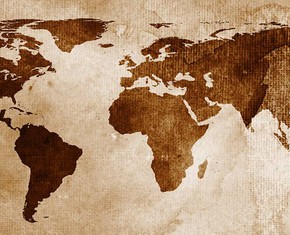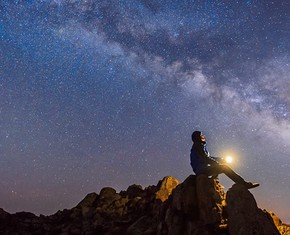The views expressed in our content reflect individual perspectives and do not represent the authoritative views of the Baha'i Faith.
Growth cannot continue forever in any finite system. Science has shown that all systems have their inherent limits, and that exceeding them only causes overshoot and collapse.
But despite our reliance on the fairy tale of eternal economic growth, you should not feel discouraged by the gloomy economic forecasts we face. Many people are looking for solutions and making progress. There are encouraging efforts at all levels in society.
If the present financial system does collapse, there are alternatives waiting to be built on the ashes of the old system.
One dimension of the way ahead is the rapidly developing concept of a green economy, defined as an economic system that preserves and restores ecosystems as the backbones of economic and social well-being. That sort of sustainable economic model is also essential for poverty reduction, while simultaneously creating new industries and employment.
In a green global economy, environmental industries using clean and efficient technologies and sustainable agriculture would serve as major engines of wealth, job creation and poverty reduction. The aim: to find combined “win-win” solutions for the economy, human well-being and the environment. This has represented a major theme for UN Environment (UNEP) and at the UN Rio+20 Summit in 2012. UNEP identified the priority green economic sectors as:
Clean and efficient technologies, including renewable energy technologies and rural energy access.
Biodiversity-based businesses, including agriculture, forestry, marine, nature-based tourism, etc.
Ecological infrastructure, including nature reserves, protected areas, watersheds, etc.
Chemicals and waste management, including waste reduction, recycling and reuse.
Low carbon cities, buildings and transport.
We also need this new green, global economy to respond to the challenges of climate change. Imagination and innovation will be required, because we know that “business as usual” is no longer a realistic option. The coordinated financial stimulus required to rebuild the world economy can either lock us into a vulnerable fossil fuel-based system, or accelerate investment in a low-carbon transition – creating jobs, technological innovation and market stimulus, and using public funds to trigger much more private finance.
We need an unprecedented multi-stakeholder collaboration to link the climate and economic agendas, responding to “the shared desire to deliver climate security, energy, food and water security, economic security, equity between rich and poor through enhanced capital and technology flows, all through the creation of a package that promotes economic growth by decarbonizing the world economy.”
The Global Commission on the Economy and Climate has shown that a new climate economy based on renewable energy sources would create better growth with more employment and a higher GDP than business as usual with a fossil fuel-based economy, while also protecting us from climate change. There is no economic reason not to make a rapid transition now.
However, most present efforts to address the economic crisis have emphasized relaunching consumption and maintaining certain sectors, such as the automobile industry, in the hope of returning to a consumption-based economy, with only marginal efforts to invest in more green alternatives.
Why? Too many vested interests want to protect the status quo.
That status quo presents a danger – that the green economy would just be consumption with a new name, when the real need is reducing consumerism. The debate on how to do this is only on the fringes and the resistance to change is very strong. Furthermore, all of these proposals are still within the economists’ growth paradigm, which is unsustainable – as growth cannot continue forever in a finite system. The consumer society is overdeveloped and the costs of unsustainability are rising. Some people even talk about “degrowth” in wealthy countries.
What the world needs, the Baha’i teachings say, is a new economic model, emphasizing the spiritual and social rather than the material forms of development:
Strive, therefore, to create love in the hearts in order that they may become glowing and radiant. When that love is shining, it will permeate other hearts even as this electric light illumines its surroundings. When the love of God is established, everything else will be realized. This is the true foundation of all economics. – Abdu’l-Baha, The Promulgation of Universal Peace, p. 239.
Putting out a large fire requires a coordinated response by many actors, and this means effective governance at the same scale as the problem. The economy has globalized, but economic management mechanisms are still largely national. The system of governance based on national sovereignty has great difficulty in addressing global problems effectively, as illustrated by the slow pace of intergovernmental action on climate change.
At the same time, the diversity of situations around the world requires a nested set of levels of governance to keep decision making close to the level of action and to encourage innovation and local adaptation. We need to evolve effective institutions of governance at all of the scales of the problems we face in global change.
There is presently a strong prejudice in many quarters against global government, often reflecting the ideological or political position that government is essentially inefficient and bureaucratic and the less we have of it the better. Yet, effective government is an essential component of any civilized society. Even the business community recognizes this. Europe has pioneered the creation of institutions at a regional scale in complement to national governments and this example, however imperfect, will be equally appropriate as we consider how to deal with global change.
The financial collapse and its aftermath have underlined the need for a systems approach integrating all the issues. Science and technology have united the world in information flow, finance, trade, migration and environmental impact. Each part affects the others, so they must be understood together in all their complexity. Yet our society is not well structured to deal with complex multidisciplinary global problems.
We must change that paradigm.
The Baha’i teachings enumerate a set of foundational principles that begin with an acknowledgement of our world citizenship, and encourage all people to be both scientifically objective and realistic about the threats and risks of global change and its implications for the economy, society and consumer behavior, while also inspiring hope and a desire to act by seeing the necessary sacrifices in a positive light:
The oneness of the kingdom of humanity will supplant the banner of conquest, and all communities of the earth will gather under its protection. … When the people of the future are asked, “To which nationality do you belong?” the answer will be, “To the nationality of humanity.” … The people of the future will not say, “I belong to the nation of England, France or Persia”; for all of them will be citizens of a universal nationality – the one family, the one country, the one world of humanity – and then these wars, hatreds and strifes will pass away. – Abdu’l-Baha, The Promulgation of Universal Peace, p. 18.
Arthur Lyon Dahl’s new book In Pursuit of Hope, A Guide for the Seeker, published by George Ronald Books, is available here.
















Comments
Sign in or create an account
Continue with Googleor